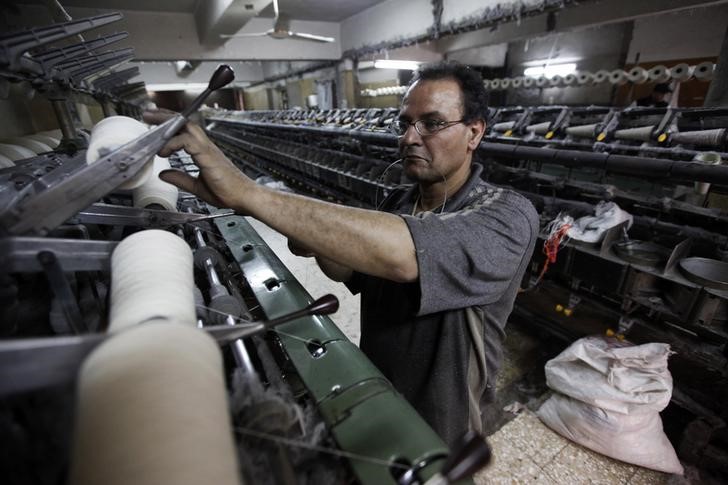Latest NEWS
- Aswat Masriya, the last word
- Roundup of Egypt's press headlines on March 15, 2017
- Roundup of Egypt's press headlines on March 14, 2017
- Former Egyptian President Hosni Mubarak to be released: lawyer
- Roundup of Egypt's press headlines on March 13, 2017
- Egypt's capital set to grow by half a million in 2017
- Egypt's wheat reserves to double with start of harvest -supply min
- Roundup of Egypt's press headlines on March 12, 2017
Ultimatum expires but Mahallah workers continue strike

A labourer works at a textile mill in Mahalla el-Kubra, about 110 km north of Cairo March 5, 2014. REUTERS/Mohamed Abd El Ghany
CAIRO, Oct. 28 (Aswat Masriya) - Workers in Egypt’s largest public sector textile company in Mahallah city north of Cairo continued to strike on Wednesday, despite the expiry of a 48-hour ultimatum by the labour minister.
The strike in the Misr Spinning and Weaving Company is in its eighth day, as workers demand a 10 percent social bonus promised by President Abdel Fattah al-Sisi in September to be paid retroactively starting July.
The social bonus seems to have been lost in translation as complex, at times conflicting laws were issued this year.
According to a Facebook post by labor rights advocates The Revolutionary Socialists group late Wednesday, which Aswat Masriya could not independently verify, the management has suspended seven workers who will be investigated for their role in encouraging the strike. They say the factory is losing EGP 4 million a day because of haulted production.
After meetings with local officials, Labor Minister Gamal Sorour said on Monday evening workers must resume production immediately so that within 48 hours Prime Minister Sherif Ismail would reach a "suitable agreement for them," warning that “legal measures will be taken against any attempts to obstruct work.”
Workers at the company were outraged at his statement, saying that he is imposing a "condition" instead of resolving the crisis.
On Tuesday, cracks began to appear between striking workers and heads of departments in the company, as the latter tried to resume production at the company's gas and power stations but failed to do so.
Workers at the industrial city of Mahallah have a long history of labour struggles. In 2008, they had planned a strike which pro-democracy activists supported through online campaigns to protest against the increased cost of living and low wages.
Even though the strike never took place, calls for solidarity led to street clashes with police and the birth of the April 6 Youth Movement, one of the groups that electrified the January 2011 uprising.
The current strike comes amid heightened urban consumer inflation which jumped to 9.2 percent in September, according to the official statistics agency CAPMAS.
It also comes during difficult economic times in Egypt, which is still reeling from the aftermath of years of social and economic turmoil following the uprising.










